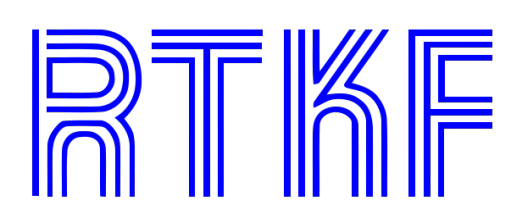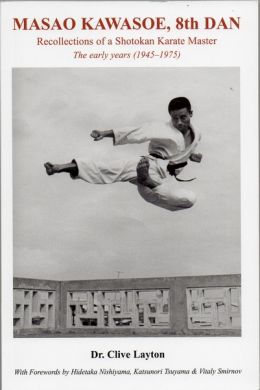|
This week (10th June 2008), Mike from Monabooks.co.uk kindly sent me a copy of the newly published ‘Masao Kawasoe, 8th Dan – Recollections of a Shotokan Karate Master – The early years (1945-1975)’ by Dr. Clive Layton. There had been rumours of such a book for a long time, and there has also been much anticipation from both within and outside the Kawasoe camp. I too anticipated the release of what I knew would be a brilliant book.
I knew this would be a brilliant book for two reasons - because it was exploring the life of one of the most highly respected shotokan teachers in the world and because it was written by Clive Layton. Enough said.
Dr. C. Layton presents the recollected first thirty years of the life of Masao Kawasoe – a living legend – an understatement that I am embarrassed to use. In the shotokan world, he is considered one of, if not the finest examples of the shotokan form.
This book, conversationally written from extended periods of discussion between Layton and Sensei Kawasoe, chronicles the very eventful first thirty years of his life starting with his childhood and eventually concluding with his life in the UK.
The book opens with forewords from Hidetaka Nishiyama, Katsunoir Tsuyama and Vitaly Smirnov – a very impressive line up. To quote Sensei Tsuyama, Kawasoe’s teacher, ‘Kawasoe Sensei is a great man, who has good technique, spirit and character’, quite the compliment wouldn’t you say.
The forewords are then followed by the preface where Layton delves into the origins of the book, and the process by which it came to be. As I am reading this, I am thinking about what an educational prospect this must have been for the author, but also the immense responsibility and pressure that came with this opportunity. As alluded to in the preface, Sensei Kawasoe has been the cover of many a magazine over the years, but there is little substantial material about him. This I both find surprising, but also exciting for Dr. Clive Layton, as I feel there are few out there who could channel the pressure of such a responsibility into such an amazing realisation.
As I have already mentioned, there is a conversational theme running through the book which emerged from Layton’s time with Sensei Kawasoe researching the book. This of course brings the history of this man to life with a vibrancy that can only emerge when coming from the man himself. He speaks with a real honesty, capitulating his personality. In the opening section of the book he talks about life in post-war Japan, including the very sad handing over of family heirlooms such as swords during the amnesty. This contextual background helps provide a profound insight into life during this time, whilst also helping the reader understand how these things affected the people around him. As I read the early part of Kawasoe’s life, this is then contrasted against what must have been a ‘light turning on’ kind of a moment when he first watched the fight between Kanazawa and Tsuyama whilst at the Cinema.
Of course, Katsunori Tsuyama was to become a major influence in Kawasoe’s life, which again, is told with a real vibrancy. When speaking of him he states ‘the best, the most rounded, that I’ve ever seen is Tsuyama’.
This part of his life is discussed at good length, with his time at Takushoku University clearly being of profound significance both in his development and also in relationships with Sensei Tsuyama and his friends. While sharing a wad of stories from his time there, he also provides some superb archive, never before seen photographs. This book, as with so many of Layton’s works, presents some wonderful photographs that are often previously unseen.
Throughout this book, Sensei Kawasoe is both frank and detailed in his descriptions. His time on the JKA Instructor’s programme, Sensei Nakayama, his time in Taiwan and Madagascar and finally the UK are looked at with a great sense of detail, and is presented in a factual rather than nostalgic manner.
The most touching part of this book however, which made me smile all afternoon, resided on the very last page. When talking about Sensei Tsuyama and relating a conversation he once had with him after a long bout of no contact he states: ‘Do you know why I have studied karate all these years and travelled the world teaching?’ (speaking to Sensei Tsuyama)… ‘Because I met you’.
This was the perfect end to a fantastic book. Every page I loved and couldn’t put it down. Everything about it is great…especially the references and notes section at the end of the book. This alone is worth buying the book for. It is jam packed with such great information pertaining to the book, but I enjoyed reading it in its entirety as a mini book in itself…I know that makes me very sad, but I don’t care.
I expected this book to be good, for all the reasons already mentioned. I did not however expect it to be this good. This I know will be a book I will return to regularly and I just hope everyone else also does not miss out on this excellent book!!!
To purchase this book, visit www.monabooks.co.uk, and also visit www.kawasoe.co.uk |

